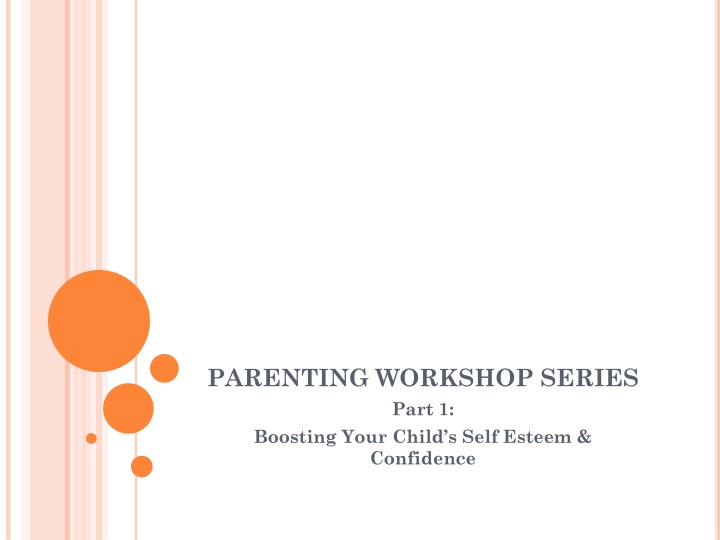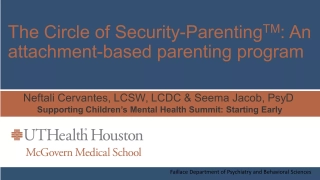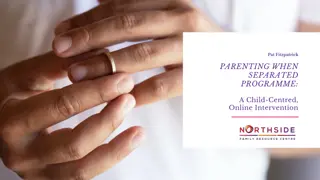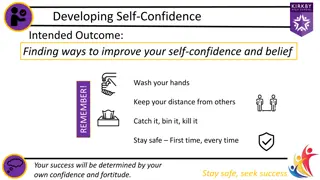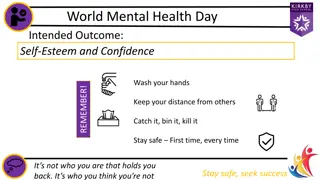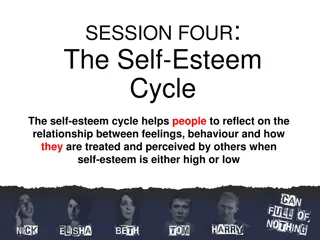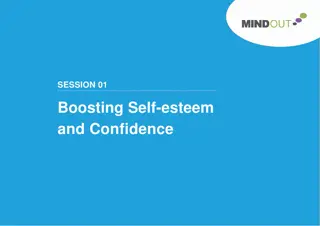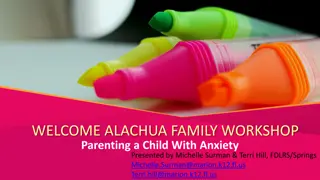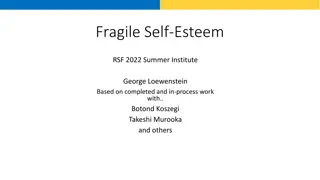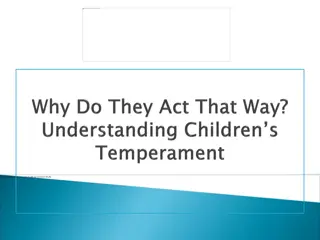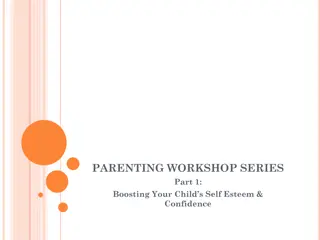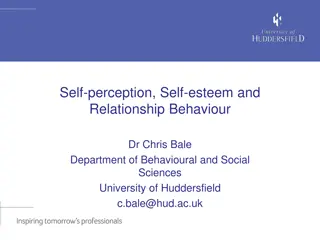Boosting Your Child's Self-Esteem & Confidence in Parenting Workshop Series
Understanding self-esteem in children is crucial for their emotional development. Healthy self-esteem leads to positive behaviors, while low self-esteem can result in negative self-perceptions. Recognizing signs of healthy and unhealthy self-esteem allows parents to support and nurture their child's confidence effectively. Tips for parents to boost their child's self-esteem include being mindful of their words, praising effort, and modeling positivity.
Download Presentation

Please find below an Image/Link to download the presentation.
The content on the website is provided AS IS for your information and personal use only. It may not be sold, licensed, or shared on other websites without obtaining consent from the author.If you encounter any issues during the download, it is possible that the publisher has removed the file from their server.
You are allowed to download the files provided on this website for personal or commercial use, subject to the condition that they are used lawfully. All files are the property of their respective owners.
The content on the website is provided AS IS for your information and personal use only. It may not be sold, licensed, or shared on other websites without obtaining consent from the author.
E N D
Presentation Transcript
PARENTING WORKSHOP SERIES Part 1: Boosting Your Child s Self Esteem & Confidence
WHAT IS SELF ESTEEM? Self -esteem is the collection of beliefs or feelings we have about ourselves. How we view ourselves influences our motivations, attitudes and behaviors and affects our emotional adjustment. Children create a self-concept based on their interactions with people. They feel success after many attempts to try something new and in turn develop ideas about their own capabilities. Self-esteem is the combination of feeling capable and feeling loved. Healthy self-esteem is achieved when the right balance between these is reached.
SIGNS OF HEALTHY AND UNHEALTHY SELF ESTEEM Self-esteem fluctuates as children grow. It is in a constant state of change because it is affected by a child s experiences and new perceptions. Kids with low self-esteem may: not want to try new things frequently speak negatively about themselves exhibit a low tolerance for frustration, give up easily, or wait for someone else to take over tend to be overly critical and easily disappointed in themselves view setbacks as permanent and have an overall sense of pessimism
SIGNS OF HEALTHY AND UNHEALTHY SELF ESTEEM Kids with healthy self-esteem may: tend to enjoy interacting with others typically be comfortable in social situations and enjoy both group and independent activities work towards finding solutions when challenges arise and can experience unhappiness without belittling themselves or others feel a general sense of optimism
Self-esteem is the real magic wand that can form a child's future. A child's self-esteem affects every area of her existence, from friends she chooses, to how well she does academically in school, to what kind of job she gets, to even the person she chooses to marry. Tips for Parents BOOSTING YOUR CHILD S SELF ESTEEM Watch what you say. Kids are sensitive to parents words. Praise your child not only for a job well done, but also for effort. Be truthful. If your child doesn t make the baseball team, avoid saying something like, Well, next time you ll work harder and make it. Instead, try Well, you didn t make the team, but I m really proud of the effort you put into it. Reward effort and completion rather than outcome. (Stephanie Martson, family therapist, author. The Magic of Encouragement, ch. 1 (1990).)
Pass down values every day through your actions, your words and your time with your kids. ~ Robert Frank Tips for Parents BOOSTING YOUR CHILD S SELF ESTEEM Be a positive role model. If you are overly harsh on yourself, pessimistic, or unrealistic about your own abilities and limitations, your child may mirror you. Bolster your own self- esteem and your child will have a great role model. When we look at a child, we see that sense of fullness, of intrinsic aliveness, of joy in being, is not the result of something else. There is value in just being oneself, it is not because of something one does or doesn t do. It is there in the beginning, when we are children, but slowly it gets lost. ~ A.H. Almass Identify and redirect your child s inaccurate beliefs. Parents need to identify kids irrational beliefs about themselves. These could be about perfection, attractiveness, ability or anything else. Help your kids to be more realistic in evaluating themselves. Mistaken beliefs and inaccurate perceptions of self can become reality to kids. Encourage your child to see a situation in its true light.
There are no seven wonders of the world in the eyes of a child. There are seven million. ~ Walt Streightiff Tips for Parents BOOSTING YOUR CHILD S SELF ESTEEM Be spontaneous and affectionate. Your unconditional love and support goes a long way to boost your child s self-esteem. Give hugs and tell your kids you re proud of them. Many parents leave little notes in their kids lunchboxes that read I think you re awesome! Give praise frequently and honestly, without overdoing it. Children can tell whether something comes from the heart. If you have only one smile in you, give it to the people you love. ~ Maya Angelou
The family is both the fundamental unit of society as well as the root of culture. It ... is a perpetual source of encouragement, advocacy, assurance, and emotional refueling that empowers a child to venture with confidence into the greater world and to become all that he can be. Tips for Parents BOOSTING YOUR CHILD S SELF ESTEEM Give positive, accurate feedback. Try not to over-generalize or exaggerate your child s behavior. Comments like You always get yourself so worked up will make kids feel like they have no control over their outbursts. A better option might be, You were really mad at your sister, but I appreciate that you didn t scream at her or hit her. This acknowledges your child s feelings, rewards the choice made and encourages your child to make the right choice again in the future. MARIANNE E. NEIFERT, Dr. Mom's Parenting Guide
Children need models more than they need critics. Tips for Parents BOOSTING YOUR CHILD S SELF ESTEEM JOSEPH JOUBER T, Pens es Create a safe, loving home environment. Kids who don t feel safe at home may suffer from low self-esteem. A child who is exposed to inappropriate situations or violence in the home may become depressed and withdrawn. Be on the look out for signs of problems in school and with peers. Deal with these issues sensitively, but quickly. Be mindful to always give your child the respect and voice they deserve. "If you want children to keep their feet on the ground, put some responsibility on their shoulders." -- Abigail Van Buren Help kids become involved in constructive experiences. Seek out activities for your child that encourage cooperation rather than competition. These types of opportunities go a long way in helping to foster self-esteem. An example would be a mentoring program in which an older child helps a younger child.
HOW TO COMPLIMENT YOUR CHILD Descriptive Praise Evaluative Praise Remember the time I lost my watch and you looked all over for it. That was so helpful and kind I love the way your shirt matches your eyes. The outfit you put together reminds me of something I saw in a magazine I was really having a rough day today. I didn t think I was going to be able to make dinner and finish the laundry. I really appreciated that you helped set the table and folded some of the clothes. That helped me relax, we re a good team! You re so smart You re so pretty You re the greatest You re so nice Can be seen as mechanical and empty. The next day it can easily be erased by a negative comment. Gives kids a fleeting sense of well being. Can make kids feel uncomfortable and defensive (you re just saying that because you re my mother). Focus on your child s abilities. Acknowledge the effort and how she made you feel. Helps kids picture their accomplishments and develop their talents. Gives kids a memory based on their concrete actions that becomes a part of their sense of self. Your child will remember this when she s feeling down.
CHILDREN LEARN WHAT THEY LIVE If Children live with criticism, they learn to condemn. If Children live with hostility, they learn to fight. If Children live with fear, they learn to be apprehensive. If Children live with pity, they learn to feel sorry for themselves. If Children live with ridicule, they learn to feel shy. If Children live with jealousy, they learn to feel envy. If Children live with shame, they learn to feel guilty. If Children live with encouragement, they learn confidence. If Children live with tolerance, they learn patience. If Children live with praise, they learn appreciation. If Children live with acceptance, they learn to love. If Children live with approval, they learn to like themselves. If Children live with recognition, they learn it is good to have a goal. If Children live with sharing, they learn generosity. If Children live with honesty, they learn truthfulness. If Children live with fairness, they learn justice. If Children live with kindness and consideration, they learn respect. If Children live with security, they learn to have faith in themselves and in those about them. If Children live with friendliness, they learn the world is a nice place in which to live. Dorothy Law Nolte, Ph.D
